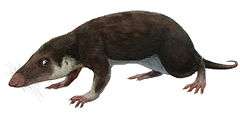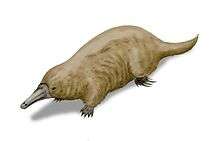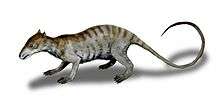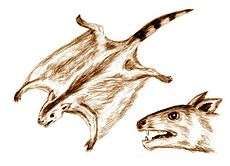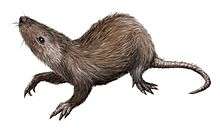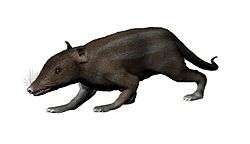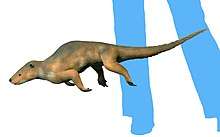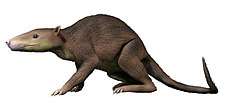Asioryctitheria
Asioryctitheria ("asian digging beasts") is an extinct order of early eutherians.
| Asioryctitheria Temporal range: Early-Late Cretaceous | |
|---|---|
 | |
| Asioryctes nemegtensis skull | |
| Scientific classification | |
| Kingdom: | |
| Phylum: | |
| Class: | |
| Subclass: | |
| Infraclass: | |
| Order: | †Asioryctitheria Novacek et al., 1997 |
| Genera | |
| |
Skull structure
With the exception of Prokennalestes, these advanced forms lacked a Meckelian groove. Furthermore, they were equipped with double-rooted canines, a lower premolar with a reduced or absent metaconid and a more elongated lower premolar than their predecessors. In addition, the entoconid and hypoconulid on the lower molars are untwinned, the entotympanic is non-existent, the alisphenoid is enlarged, a Vidian foramen is present as well as a promontorium linked to the paroccipital process via the crista interfenestralis.
Classification
Asioryctitheria contains at least four genera and two families.[1][2]
- Sasayamamylos kawaii Kusuhashi et al. 2013
- Kennalestidae Kielan-Jaworowska 1981
- Kennalestes gobiensis Kielan-Jaworowska 1981
- Asioryctidae Szalay 1977
- Asioryctes nemegetensis Kielan-Jaworowska 1975
- Ukhaatherium nesovi Novacek et al. 1997
gollark: One would hope so. If I cared about ordering of data and stuff I would just use SQLite or something myself.
gollark: Relying on specific filesystem ordering seems kind of a silly thing to do generally.
gollark: That happened to me too. I wonder what Discord *did*.
gollark: Well, not sci-fi level, but definitely nanotechnology and pretty advanced.
gollark: Lots of modern and not-that-modern technology is very impressive if you consider how complex it is. Like how CPUs are basically insanely advanced nanotechnology which they manufacture at the scale of, well, not individual atoms, but smallish groups of atoms, mass-produced and sold very cheaply.
References
- Mikko's Phylogeny Archive Haaramo, Mikko (2007). "Basal Eutheria – placental mammals and relatives". Retrieved 30 December 2015.
- Paleofile.com (net, info) "Archived copy". Archived from the original on 2016-01-11. Retrieved 2015-12-30.CS1 maint: archived copy as title (link). "Taxonomic lists- Mammals". Archived from the original on 11 January 2016. Retrieved 30 December 2015.
Further reading
- Zofia Kielan-Jaworowska, Richard L. Cifelli, and Zhe-Xi Luo, Mammals from the Age of Dinosaurs: Origins, Evolution, and Structure (New York: Columbia University Press, 2004), 499–501.
External links
- MESOZOIC MAMMALS; Basal Eutheria Two, an internet directory
- A eutherian mammal from the Early Cretaceous of Russia at Ingenta
This article is issued from Wikipedia. The text is licensed under Creative Commons - Attribution - Sharealike. Additional terms may apply for the media files.
